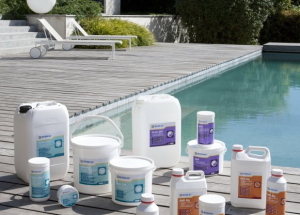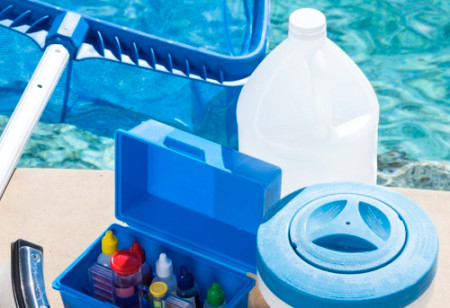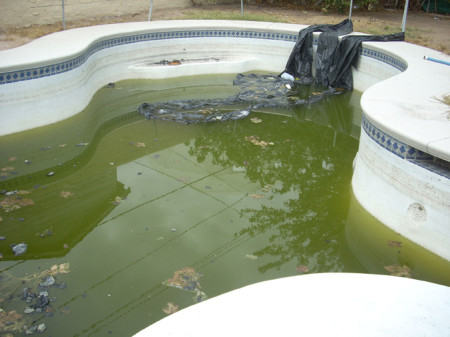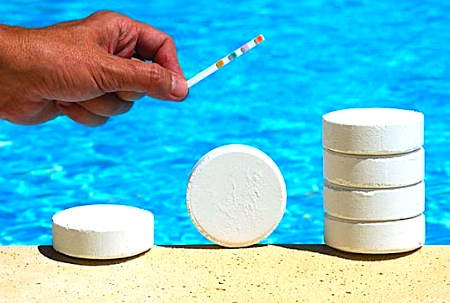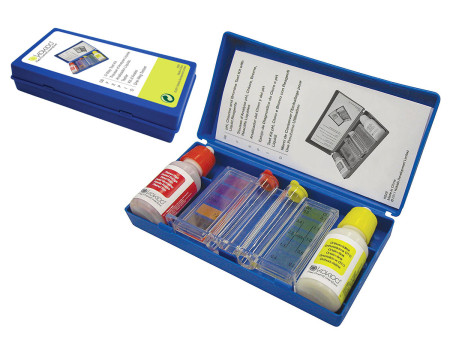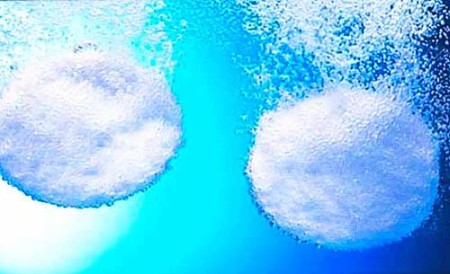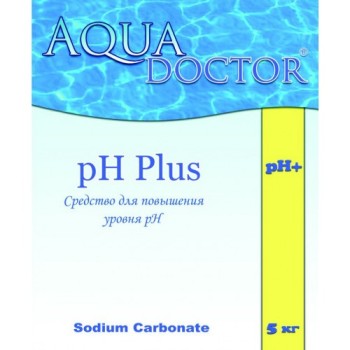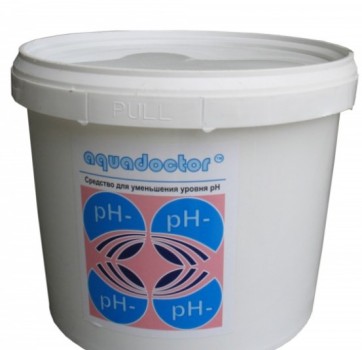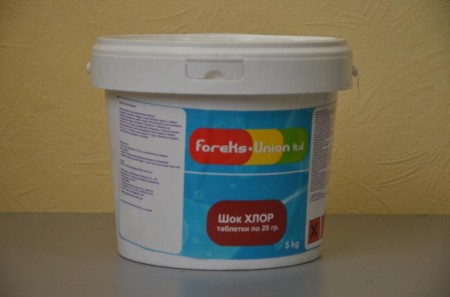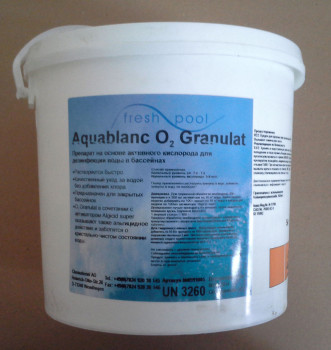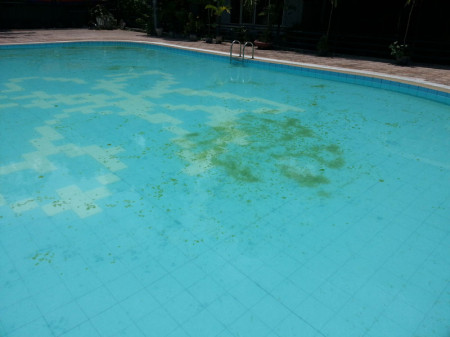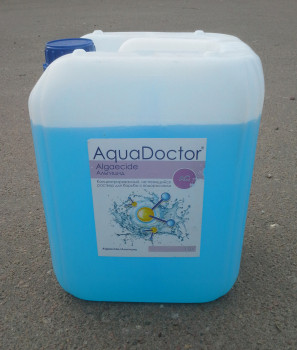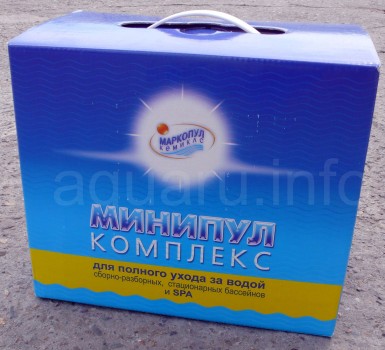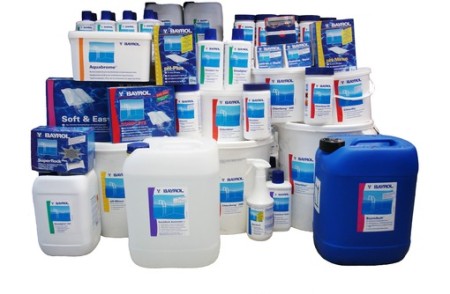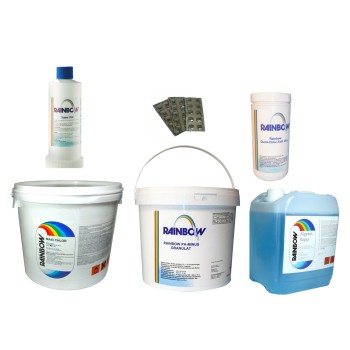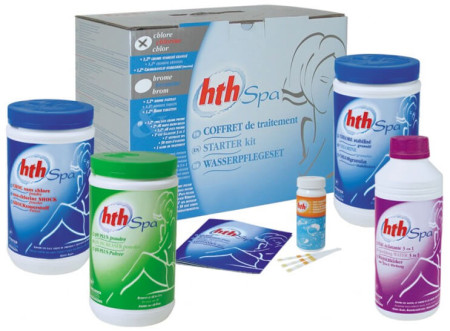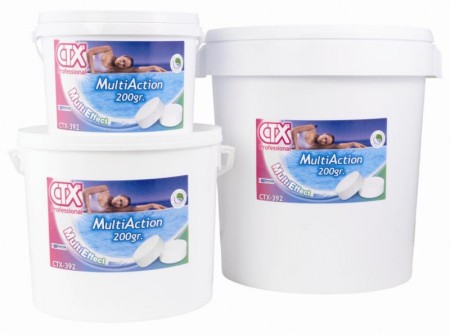The pool should be absolutely safe and comfortable place for a pleasant pastime and rest. For this, it is necessary to constantly monitor not only the serviceability of the equipment and the cleanliness of the basin bowl, but also the state of the water.
Not everyone has the opportunity to change the water in the pool every few days, so you have to use a variety of chemicals for cleaning and disinfection of water. The assortment of chemical products includes several dozen items. All these drugs have different effects and are also applied in different ways. What kind of chemistry for the pool is necessary for use, and what is not, how to choose and use reagents correctly - we read in this publication.
Content
- 1 Feasibility of using chemistry for swimming pools
- 2 How to clean water in the pool: stages
- 3 Types of chemicals for swimming pools
- 4 Disinfection of water
- 5 The fight against algae and the prevention of their development
- 6 Means for purification of turbid water
- 7 A few tips for using water treatment chemicals in the pool
Feasibility of using chemistry for swimming pools
The pool can be compared with a Petri dish - it also boasts a mass of microorganisms that spoil the products of their vital activity, and some can become a source of dangerous diseases. It is impossible to purify water with the help of filtration - the filters can not hold microorganisms and in no way affect the vital activity of bacteria and fungi. In this regard, there is a need to use chemical agents for disinfection and water purification.
It should be noted that if chemicals are used correctly, they will not cause harm to health, but dirty water is guaranteed to become a source of various kinds of infections.
Chemicals for swimming pools are designed for the following tasks:
• Complete destruction and prevention of the appearance of mold, fungi, viruses and bacteria.
• pH adjustment.
• Purification of water (clarification).
• Destruction of algae and prevention of their appearance.
All drugs, the purpose of which is to clean the pool, are produced by different companies, have a multifunctional or narrowly directed effect. From the entire range, you should choose several products that will keep the pool water clean.
How to clean water in the pool: stages
All measures for water purification can be conditionally divided into several stages:
First, you need to determine the current pH level of the water in the pool. The optimal value is from 7.0 to 7.4. The pH is measured with a special tester. This operation should be carried out at least 1-2 times a week, if the pool is closed, and after each rain in the outdoor pools.
The pH level is regulated by means of pH + or pH-.
Disinfection of the pool. This preventive operation should be carried out regularly - at least once a week. Shock disinfection - complete destruction of microorganisms in water is carried out, for example, when water is heavily polluted, or when the pool is first filled.
Correction of water composition. It is necessary, when after disinfection the water in the bowl is still cloudy, there are insignificant pollution and algae. Correction of water composition can be carried out simultaneously with disinfection. After cleaning and correcting the water composition, it must be checked once again for pH.
Types of chemicals for swimming pools
All drugs to care for the pool are divided into several groups, depending on the purpose:
Means to maintain the pH level.
The optimal acid-base balance is necessary for the effective use of chemicals and the comfort of people swimming in the pool (prevents the appearance of skin and eye irritation). In addition, at an optimum pH level, there is no lime deposit, and the basin itself is less corroded.
The pH level is adjusted after the appropriate test, but it can be roughly determined and "by eye". For example, if the water in the pool has a blue tint, this indicates a lowered pH, greenish - about increased.
Most often, pool owners have to lower the pH level to prevent turbidity of water. To this end, the pH is used. Before completely clearing the water, the acid-base level is recommended to be lowered to 6.8.
Quite rare, but there is a need to increase the acid-base balance. Both drugs are produced in the form of tablets or liquids. The order of their application depends on the composition, which can be different, depending on the manufacturer.
Disinfection of water
Disinfection of water in the basin is carried out in several directions:
• Start disinfection (using chlorine shock for the pool).
• Preventive disinfection (long acting chlorine is used).
The basis of shock chlorine is the usual organic chlorine, which when dissolved in water creates a high concentration of active chlorine. With the help of shock chlorine, it is possible to substantially purify water - virtually all contamination will precipitate.
The consumption of drugs "shock chlorine" can be different, the same can be said about the price - it all depends on the manufacturer. For example, preparations of disinfection of a pool of Chinese manufacturers can be purchased at a fairly low price, but their consumption and efficiency leave much to be desired. In the composition of cheap preparations very often include chlorine lime instead of organic chlorine.
Shock treatment of water in the basin is carried out, on average, once a month. Its necessity arises in the following cases:
• If the pool water temperature is too high.
• If the pool is used very often.
• If the pool is open.
• If the filtration of water has not been done properly.
To maintain the water in the pool in the proper condition, long-acting chlorine is used between the "shock" treatments, which provides a small concentration (0.5-1 mg / l) of the disinfectant in the water. This is quite enough to inhibit the development of microorganisms in water.
For the purpose of disinfection, it is possible to use means that do not contain chlorine. These include:
• Preparations containing active oxygen and bromine (in dry and liquid form).
• Preparations containing biguanide.
The fight against algae and the prevention of their development
In the open pool it is not always possible to completely get rid of algae with the help of chlorine alone. In order not to bloom water in the pool, you have to use additional funds, namely - drugs from the group of algaecides, which, penetrating into the spores of algae, kill it. Algaecides, intended for use in swimming pools, are very numerous for sale, and their composition is almost the same. The difference is only in the concentration of the active substance, the number of additives and the presence of the ability to foam.
As soon as the first signs of algae development appear in the basin, and this may be a green suspension and a deposit on the walls, it is necessary to apply a shock dose of algaecides. For preventive maintenance in water the duty dose is added. The amount of the drug used should be determined according to the instructions, it depends on the concentration of the active substance and the form of release of the drug.
Means for purification of turbid water
To eliminate turbidity in water (organic and mineral particles), with which the filters can not cope, apply coagulants. These drugs should be used only for acute need. If you apply them regularly, the filter will begin to clog. Sometimes it is possible to use a coagulant in small doses, feeding it into water through an automatic dispenser. In this case, a liquid preparation is more suitable - tablets for the pool are used only in case of strong turbidity of the water.
Special tools for the care of the pool. There are many additional chemical reagents that are used to care for the pool:
• Means that regulate water hardness.
• Means for the care of equipment.
• Means for conserving the pool for the winter.
• Preparations for filter cleaning.
• Preparations for the removal of oily film from the surface of water and the walls of the pool.
Overview of manufacturers of chemicals for swimming pools
There are several domestic and foreign manufacturers specializing in the production of chemistry for swimming pools, whose products have proved themselves well: Bayrol, NTN, STX, Markopoul, Aquatics, Aquaductor.
So, the German manufacturer Bayrol represents the widest assortment of means for pools which can be applied for manual and automatic disinfection of water. All Bayrol preparations are certified and have passed the necessary expertise.
In addition to preparations for water treatment, the company offers a number of tools for cleaning the pool bowl:
• Stiffness stabilizers (prevent the formation of calcareous deposits).
• Chemistry for cleaning the waterline.
• Cleaners for filters.
The manufacturer also implements testers and strips to determine the pH and the percentage of chlorine and bromine in water.
The manufacturer of chemicals for swimming pools NTN also offers consumers a wide range of products. Along with standard products, the company specializes in the production of the following chemicals:
• Disinfectants containing chlorine that do not contain cyanuric acid.
• Chemicals for the care of SPA-pools.
Among the wide range of CTX chemistry, the following drugs are in great demand:
Means for correcting the pH level in water are granular.
Means to prevent the formation of calcareous deposits on the walls of the pool (CTX-600 "Antinakipin").
Liquid flocculant CTX-41.
СТХ-75 - the preparation prevents the appearance of foam, and also degreases the walls of the pool.
Using chemicals of the brand Aquatic, you can make a complete cleaning of the water and the pool. The complex of preparations includes:
PH regulators.
Disinfectants based on active chlorine.
Coagulants.
Algicide (not used in medical pools.)
Manufacturer Aquaductor offers a full range of chemicals for swimming pools. The quality and price of the goods of this manufacturer are at the same level as the products of the German company Bayrol. The range of Aquaductor products also includes chemistry for inflatable pools.
Another popular domestic brand specializing in the production of chemicals for swimming pools is Markopoul. The product of this brand is sold at very democratic prices and is highly efficient. In addition, Markopul implements special devices for controlling the water parameters in the pool: photometers, tablets, testers, quintessers.
A few tips for using water treatment chemicals in the pool
- All means must be used strictly according to the manufacturer's instructions.
- When choosing reagents, you need to know exactly the amount of water in the pool.
- It is desirable to add chemistry through a skimmer or a special float.
- After using chemicals, you can swim in the pool not earlier than two hours later.
- Disinfectants without chlorine are more expensive, but they are more flammable and do not cause allergies.
- For "shock" disinfection it is necessary to use the means with active chlorine.
- For swimming pools of the Chinese manufacturer Intex, an alternative to standard chemistry may be the installation of a chlorine generator.
- Shock disinfection of the pool is carried out at night.
- Dry preparations and tablets can not be added directly to the pool, before use, they must be dissolved in a small amount of water.
As is clear from all of the above, there is a large number of drugs for the care of the pool. Some chemicals are mandatory, and some are not. Before you buy the chemistry for the pool, you need to properly assess the condition of the water and choose the appropriate set of chemical reagents.


